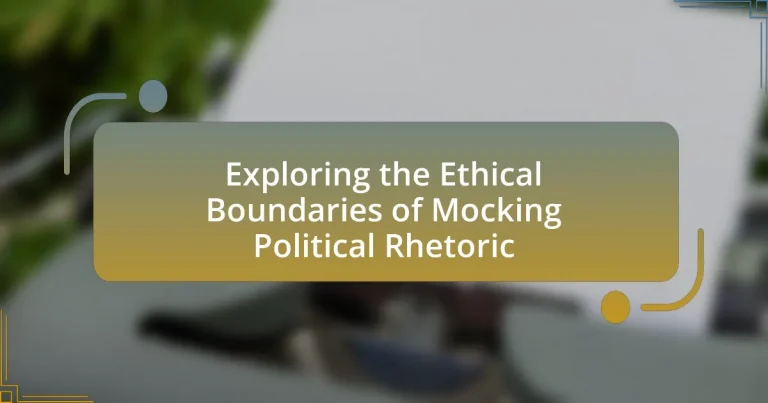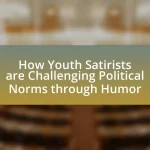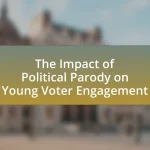The article examines the ethical implications of mocking political rhetoric, highlighting its impact on democratic discourse, public perception, and societal polarization. It discusses how satire and humor can influence political engagement while also raising concerns about misinformation and the trivialization of serious issues. The piece explores various forms of political mocking, the psychological effects on audiences, and the ethical frameworks that guide responsible satire. Additionally, it addresses the role of cultural contexts and media platforms in shaping political discourse, emphasizing the importance of maintaining respect and accuracy in satirical content to foster constructive dialogue.
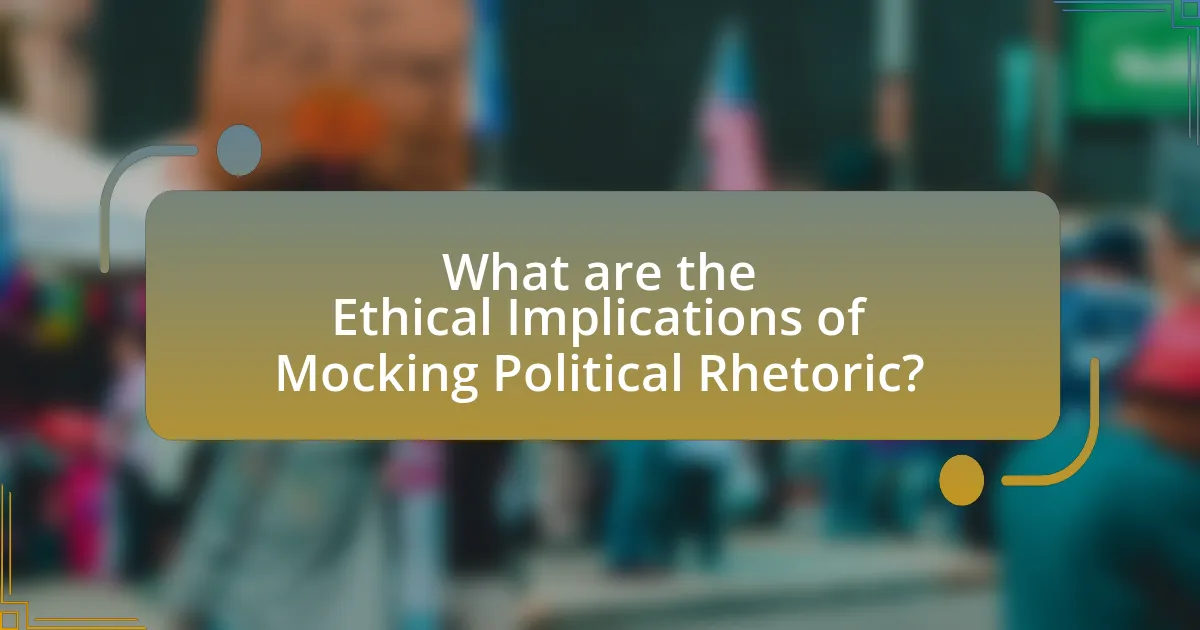
What are the Ethical Implications of Mocking Political Rhetoric?
Mocking political rhetoric raises significant ethical implications, primarily concerning respect for democratic discourse and the potential for misinformation. When individuals or groups mock political statements, they risk undermining the seriousness of political dialogue, which is essential for informed citizen participation in democracy. This mockery can lead to the trivialization of important issues, as seen in instances where satire overshadows substantive debate, such as during election cycles when candidates’ policies are often reduced to caricatures rather than critically examined.
Moreover, mocking rhetoric can perpetuate division and polarization within society. Research indicates that humor targeting political figures can reinforce existing biases, as audiences may only engage with content that aligns with their pre-existing beliefs, thereby deepening societal divides (Source: “The Role of Humor in Political Communication,” by Jennifer L. McMahon, Journal of Political Communication, 2020). This phenomenon raises ethical concerns about the responsibility of communicators to foster constructive dialogue rather than contribute to an environment of hostility and misunderstanding.
In summary, the ethical implications of mocking political rhetoric include the potential erosion of respectful discourse and the risk of exacerbating societal divisions, both of which are detrimental to the health of democratic engagement.
How does mocking political rhetoric influence public perception?
Mocking political rhetoric significantly influences public perception by shaping attitudes and beliefs about political figures and issues. When satire or parody is employed, it often highlights the absurdities or contradictions in political discourse, making it easier for the public to question the credibility of the rhetoric being presented. Research indicates that exposure to satirical content can lead to increased political engagement and critical thinking among audiences, as evidenced by studies showing that viewers of political satire are more likely to discuss political issues and seek out additional information. For instance, a study published in the journal “Political Communication” found that individuals who consume satirical news are more informed about political events compared to those who do not. This suggests that mocking political rhetoric not only entertains but also serves as a tool for fostering a more informed electorate.
What psychological effects does mocking have on audiences?
Mocking can lead to various psychological effects on audiences, including feelings of superiority, social bonding, and desensitization to aggression. Research indicates that when individuals engage in or witness mocking, they often experience a boost in self-esteem due to perceived social dominance over the mocked individual. This phenomenon is supported by social comparison theory, which suggests that people derive self-worth from comparing themselves to others. Additionally, mocking can foster group cohesion among those who share the same viewpoint, as it reinforces in-group identity and solidarity against an out-group. However, repeated exposure to mocking can also desensitize audiences to aggressive behaviors, making them more accepting of hostility in social interactions. Studies have shown that humor, particularly when it involves ridicule, can normalize aggressive attitudes and behaviors, leading to a potential increase in tolerance for bullying and discrimination.
How does mocking shape political discourse?
Mocking shapes political discourse by influencing public perception and engagement through humor and satire. This form of communication can simplify complex political issues, making them more accessible and relatable to the general public. For instance, political cartoons and satirical shows like “Saturday Night Live” often highlight the absurdities of political figures and policies, prompting audiences to critically evaluate their leaders. Research indicates that humor can enhance message retention and encourage political participation, as seen in studies by the Pew Research Center, which found that satirical content can increase awareness and discussion of political issues among younger demographics.
Why is it important to consider ethics in political satire?
Considering ethics in political satire is crucial because it shapes public discourse and influences societal norms. Ethical political satire can promote accountability and encourage critical thinking, while unethical satire may perpetuate misinformation and harm marginalized groups. For instance, studies have shown that satire can significantly impact political engagement and voter behavior, highlighting the responsibility of satirists to balance humor with factual integrity. By adhering to ethical standards, political satire can serve as a constructive tool for social commentary rather than a vehicle for division or falsehoods.
What ethical frameworks can be applied to political mocking?
Political mocking can be analyzed through several ethical frameworks, including utilitarianism, deontology, and virtue ethics. Utilitarianism evaluates the consequences of political mocking, assessing whether it promotes overall happiness or harm. For instance, if mocking a politician leads to increased public engagement and awareness, it may be deemed ethically acceptable. Deontology focuses on the morality of the act itself, suggesting that mocking may be unethical if it disrespects individuals or undermines democratic discourse. Virtue ethics emphasizes the character and intentions behind the mocking, questioning whether it reflects virtues like honesty and integrity. Each framework provides a distinct lens to evaluate the ethical implications of political mocking, highlighting the complexity of its role in political discourse.
How do cultural contexts affect the ethics of political satire?
Cultural contexts significantly influence the ethics of political satire by shaping societal norms, values, and sensitivities. In societies where freedom of expression is highly valued, political satire may be seen as a legitimate form of critique, fostering democratic discourse. Conversely, in cultures with strict political or social hierarchies, satire can be perceived as disrespectful or dangerous, potentially leading to censorship or punitive measures against satirists. For instance, in the United States, political satire is often embraced as a tool for social commentary, as evidenced by shows like “Saturday Night Live,” which regularly critiques political figures without severe repercussions. In contrast, in countries like North Korea, political satire is virtually nonexistent due to the oppressive regime that punishes dissent. Thus, the ethical implications of political satire are deeply intertwined with the cultural context in which it is produced and consumed.
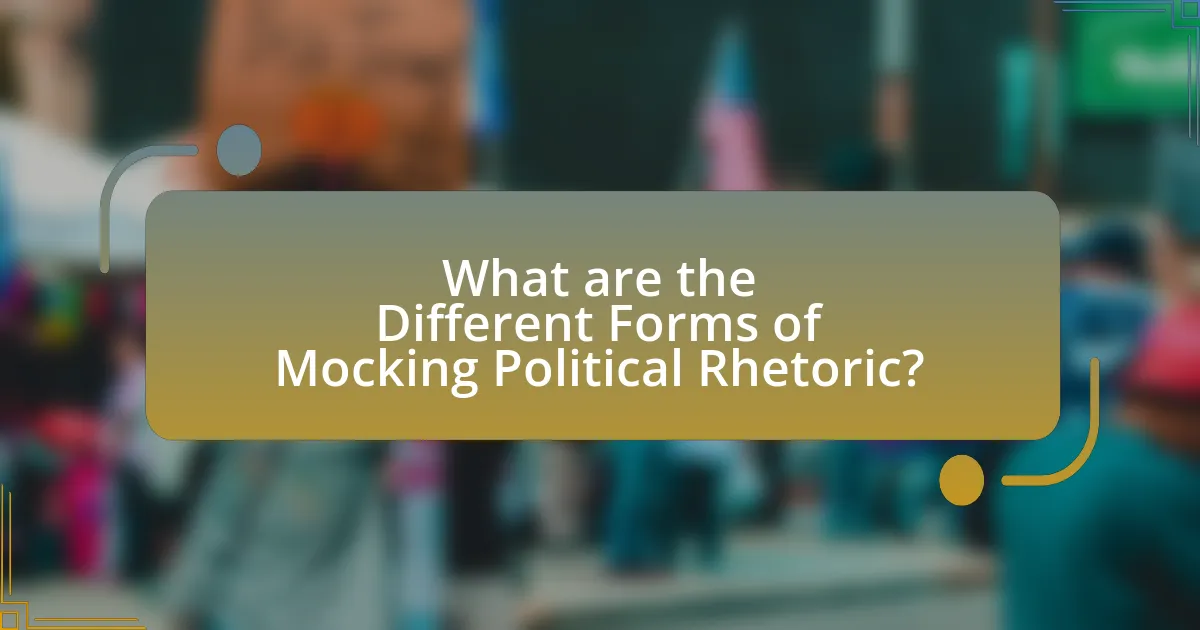
What are the Different Forms of Mocking Political Rhetoric?
Different forms of mocking political rhetoric include satire, parody, caricature, and irony. Satire employs humor, exaggeration, or ridicule to criticize political figures or policies, as seen in programs like “Saturday Night Live.” Parody imitates the style of political speeches or campaigns to highlight absurdities, often used in comedic sketches. Caricature visually exaggerates features of politicians to convey criticism, commonly found in editorial cartoons. Irony involves stating the opposite of what is meant, often revealing contradictions in political statements or actions. Each form serves to engage audiences while provoking thought about political discourse.
How do various media platforms utilize mocking in political discourse?
Various media platforms utilize mocking in political discourse as a tool for satire and critique, often to highlight the absurdities or contradictions in political statements and actions. For instance, television shows like “Saturday Night Live” and online platforms such as Twitter frequently employ humor and parody to draw attention to political figures’ behaviors, thereby shaping public perception and discourse. Research indicates that satirical content can enhance political engagement by making complex issues more accessible and relatable to audiences, as evidenced by studies showing increased viewer awareness and discussion following satirical portrayals of political events.
What role do social media and memes play in political mocking?
Social media and memes serve as powerful tools for political mocking by enabling rapid dissemination of satirical content that critiques political figures and policies. These platforms facilitate the creation and sharing of humorous images, videos, and text that often exaggerate or distort political messages, making them more accessible and engaging to a wider audience. For instance, during the 2016 U.S. presidential election, memes targeting candidates like Donald Trump and Hillary Clinton went viral, illustrating how humor can shape public perception and influence political discourse. Research indicates that such memes can enhance political engagement, as they encourage discussions and reflections on political issues while also providing a means for individuals to express dissent or support in a lighthearted manner.
How does traditional media differ in its approach to political satire?
Traditional media approaches political satire through structured formats and editorial oversight, contrasting with the more spontaneous and often unregulated nature of digital platforms. Traditional media, such as newspapers and television, typically employs established comedic formats, like editorial cartoons or satirical news segments, which adhere to journalistic standards and ethical guidelines. For instance, programs like “Saturday Night Live” or “The Daily Show” often blend humor with critical analysis, ensuring that satire is grounded in factual reporting. This contrasts with online platforms, where content can be created and disseminated rapidly, often lacking the same level of scrutiny, which can lead to misinformation or more extreme forms of satire. The reliance on editorial processes in traditional media serves to maintain a balance between humor and responsible commentary, reflecting a commitment to ethical standards in political discourse.
What are the potential consequences of mocking political figures?
Mocking political figures can lead to significant consequences, including the polarization of public opinion and the erosion of political discourse. When political figures are mocked, it can reinforce existing biases among supporters and opponents, creating deeper divides within society. Research indicates that satire and mockery can influence public perception, often leading to increased animosity and reduced willingness to engage in constructive dialogue. For instance, a study published in the journal “Political Communication” found that exposure to satirical content can solidify partisan attitudes, making individuals less open to opposing viewpoints. Additionally, mocking political figures may provoke backlash, resulting in intensified loyalty among their supporters and potential repercussions for the mockers, such as social or professional ostracism.
How can mocking lead to political polarization?
Mocking can lead to political polarization by reinforcing in-group and out-group dynamics, which heightens divisions among political factions. When individuals mock opposing viewpoints, it often serves to dehumanize or delegitimize those who hold different beliefs, making it easier for people to dismiss or antagonize them. Research indicates that humor, particularly when used in a mocking context, can strengthen group identity and solidarity while simultaneously alienating those outside the group. For example, a study published in the journal “Political Psychology” found that derogatory humor about political opponents increased participants’ support for their own party and decreased their willingness to engage in dialogue with the opposing side. This cycle of mockery and reinforcement contributes to a more polarized political landscape, as individuals become entrenched in their beliefs and less open to compromise or understanding.
What are the risks of misinterpretation in political satire?
The risks of misinterpretation in political satire include the potential for audiences to misunderstand the intended message, leading to the reinforcement of false beliefs or stereotypes. Political satire often employs exaggeration and irony, which can be easily misconstrued by individuals who lack the context or critical thinking skills necessary to decode the humor. For instance, a satirical portrayal of a political figure may be taken literally, resulting in public misinformation about that individual’s policies or actions. Research indicates that audiences with lower media literacy are more susceptible to these misinterpretations, which can ultimately distort public discourse and influence political opinions negatively.
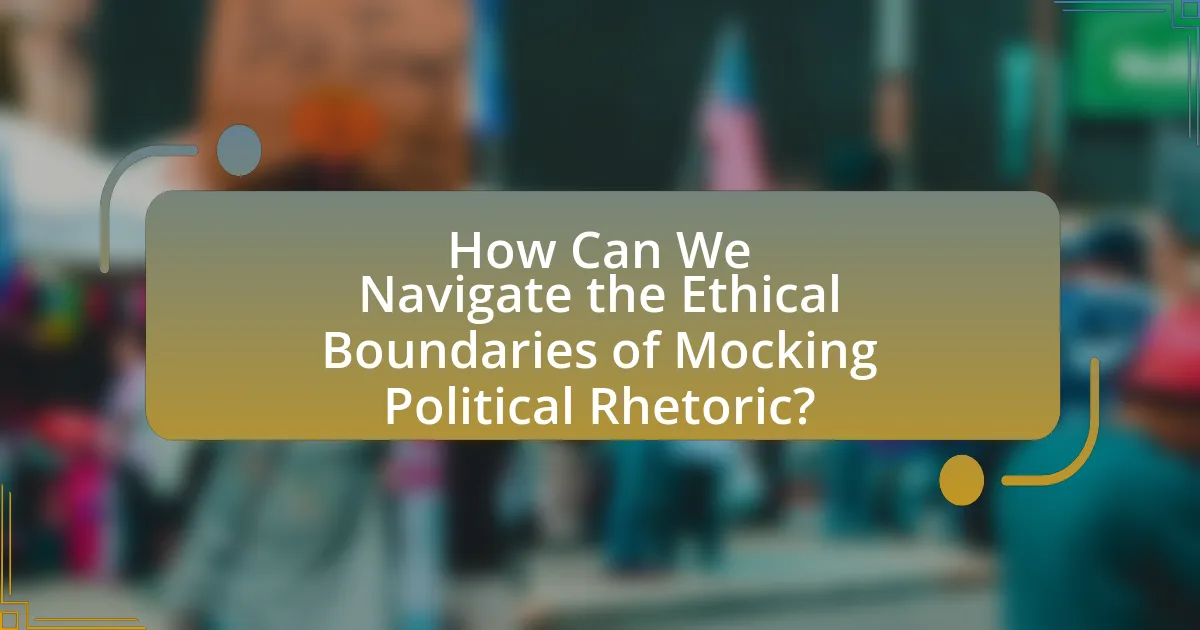
How Can We Navigate the Ethical Boundaries of Mocking Political Rhetoric?
To navigate the ethical boundaries of mocking political rhetoric, individuals should prioritize respect and accuracy while ensuring that satire serves a constructive purpose. Ethical mocking involves critiquing ideas rather than attacking individuals, which can be supported by historical examples where satire has prompted political accountability, such as the works of Jonathan Swift or more contemporary figures like John Oliver. These examples illustrate that effective political satire can highlight flaws in rhetoric without descending into personal attacks, thereby maintaining ethical standards.
What guidelines can be established for ethical political satire?
Ethical political satire should adhere to guidelines that promote respect, truthfulness, and social responsibility. Firstly, satire must avoid personal attacks and focus on political actions or policies rather than individuals’ character, as this maintains a level of respect and avoids defamation. Secondly, it should strive for accuracy, ensuring that the satire is based on factual information to prevent the spread of misinformation, which can mislead the audience. Thirdly, ethical satire should encourage constructive dialogue rather than division, aiming to provoke thought and discussion rather than hostility. Lastly, it should be sensitive to the context and potential impact on marginalized groups, ensuring that humor does not perpetuate stereotypes or harm vulnerable populations. These guidelines help maintain the integrity of satire as a tool for political critique while fostering a more informed and respectful public discourse.
How can satirists balance humor and respect in their work?
Satirists can balance humor and respect in their work by employing a nuanced understanding of their subjects and focusing on constructive criticism rather than personal attacks. This approach allows satirists to highlight flaws in political rhetoric while maintaining a level of dignity for the individuals involved. For instance, using irony and exaggeration to critique policies or actions can effectively convey a message without dehumanizing the subjects. Research indicates that satire can foster public discourse when it encourages reflection rather than ridicule, as seen in studies by the Pew Research Center, which found that audiences appreciate satire that provokes thought while remaining respectful.
What role does audience responsibility play in interpreting satire?
Audience responsibility is crucial in interpreting satire as it determines how effectively the intended message is understood. Satire often employs exaggeration, irony, and humor to critique societal issues, requiring the audience to engage critically with the content. For instance, a study by the Pew Research Center found that individuals with higher media literacy are better equipped to discern the underlying messages in satirical content, leading to a more nuanced understanding of the satire’s intent. This indicates that the audience’s ability to recognize context, tone, and cultural references significantly influences their interpretation, ultimately shaping the impact of the satire on public discourse.
What best practices should be followed when engaging in political mocking?
When engaging in political mocking, it is essential to maintain respect for differing viewpoints and avoid personal attacks. This practice fosters constructive dialogue rather than deepening divisions. Additionally, using humor that highlights absurdities in political rhetoric can be effective, as it encourages critical thinking without alienating audiences. Research indicates that humor can enhance message retention and engagement, making it a powerful tool when used thoughtfully. For instance, a study published in the journal “Political Psychology” by researchers at the University of California found that humor in political discourse can increase audience receptiveness to messages while still allowing for critique.
How can individuals ensure their satire is constructive rather than harmful?
Individuals can ensure their satire is constructive rather than harmful by focusing on promoting dialogue and understanding rather than perpetuating division. Constructive satire should aim to highlight flaws in ideas or behaviors while encouraging critical thinking and reflection, rather than attacking individuals personally. For instance, satire that critiques policies or political rhetoric can stimulate discussion and awareness, as seen in the works of satirists like Jon Stewart, who often used humor to shed light on serious issues without resorting to personal attacks. By maintaining a clear distinction between critique of ideas and personal insults, individuals can create a more positive impact through their satirical expressions.
What strategies can be employed to foster healthy political discourse through satire?
Employing satire to foster healthy political discourse can be achieved through strategies such as promoting critical thinking, encouraging diverse perspectives, and maintaining a respectful tone. Critical thinking can be enhanced by using satire to challenge prevailing narratives, prompting audiences to question assumptions and engage in deeper analysis of political issues. Encouraging diverse perspectives involves incorporating various viewpoints in satirical content, which can help audiences understand different sides of a political argument, thereby enriching the discourse. Maintaining a respectful tone is crucial; satire should aim to critique ideas rather than attack individuals, as this approach fosters a more constructive dialogue. Research indicates that satire can effectively stimulate political engagement and discourse when it is used thoughtfully, as seen in studies by researchers like Peter McGraw and others, who highlight the role of humor in facilitating discussions around contentious topics.
